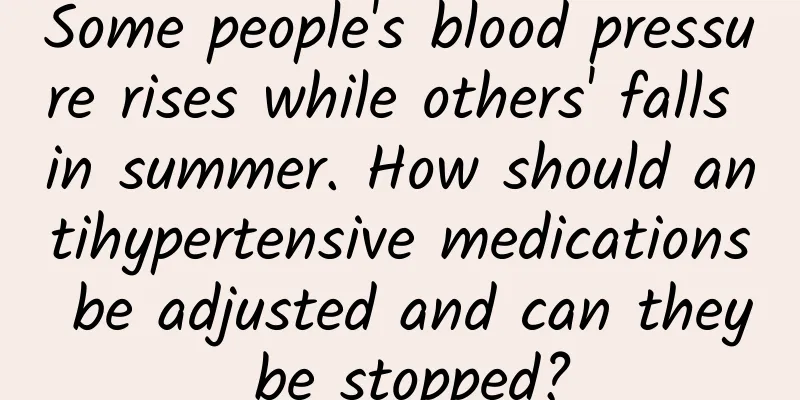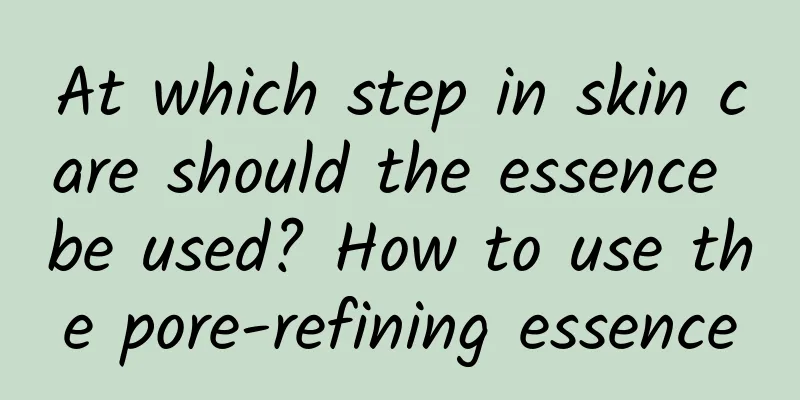Some people's blood pressure rises while others' falls in summer. How should antihypertensive medications be adjusted and can they be stopped?

|
Recently, many friends' blood pressure has fluctuated. Most people's blood pressure is low, while a few people's blood pressure is high. Those with lower blood pressure asked Huazi, how to adjust antihypertensive drugs? If the blood pressure is still low after reducing it to the lowest amount, can the drug be stopped? Those with high blood pressure were worried. If their blood pressure was high in the summer, would it be even higher in the fall and winter? Should they increase their medication dosage now? Huazi told them that they had to carefully analyze the reasons before deciding whether to adjust the medication. 1. Blood pressure changes in summer For most patients with hypertension, blood pressure fluctuates from high in winter to low in summer . There are two main reasons why blood pressure drops in summer. First, because the ambient temperature rises, the blood vessels on the surface of the body expand in order to increase heat dissipation. Second, because the amount of sweating increases in summer, a large amount of sodium ions are discharged with sweat, which reduces blood volume and sodium ion levels. However, the blood pressure of some patients with hypertension may rise , because the long days and short nights in summer, the hot temperature will shorten the sleep time and make people irritable. Lack of sleep and irritability will cause high blood pressure. Studies have also shown that in summer, the blood pressure of many people will decrease during the day and increase at night. 2. Medication adjustment when blood pressure is lowered 1. What kind of blood pressure needs to be adjusted and medicated : The ideal blood pressure of the human body is 120/80mmHg. When taking antihypertensive treatment, the ideal blood pressure should be used as the control target as much as possible. Moreover, lower blood pressure has a stronger protective effect on organs such as the heart, brain, and kidneys. Generally speaking, medication adjustment is recommended only when the high blood pressure is lower than 110mmHg, the low blood pressure is lower than 60mmHg, or when symptoms of insufficient blood supply such as dizziness, palpitations, and chest tightness occur . 2. When adjusting antihypertensive drugs , you should first reduce the dosage and then reduce the type of drugs . Read the drug instructions carefully and gradually reduce the drugs you take to the minimum therapeutic dose recommended in the instructions . After reaching the minimum therapeutic dose, if blood pressure is still low, patients who use multiple antihypertensive drugs in combination can use diuretics (such as hydrochlorothiazide, indapamide, etc.) as the first type of drug to be reduced , because the sodium and water excretion effects of diuretics are similar to the mechanism of increased sweating in summer. Pril and sartan have milder effects and less adverse reactions, so they can be the second type to be eliminated . Dihydrotestosterone drugs can cause tachycardia, headache, facial flushing and other adverse reactions in the initial stage of use, but these will disappear with continuous use. In order to avoid initial adverse reactions, dihydrotestosterone drugs are placed as the third type to be eliminated . Lorraine drugs may experience a "rebound phenomenon" when the dosage is reduced or discontinued, which can cause a sudden rise in blood pressure and tachycardia, and induce cardiovascular events. Therefore, a longer discontinuation period (no less than two weeks) is required. The risk of short-term discontinuation is relatively high. Moreover, for patients with heart disease, the use of Lorraine drugs is not only to lower blood pressure, but also to improve the prognosis of the disease, so discontinuation is not recommended . This order of discontinuation of medication is only a reference. Each patient's condition is different, and the reaction after taking the medication is also different. During actual treatment, medication adjustments should be made under the guidance of a doctor. 3. Try not to stop taking medication completely : Hypertension is a chronic disease that cannot be cured and requires continuous medication control. Although blood pressure is normal or low in summer, it is also achieved under the effect of antihypertensive drugs. Stopping medication completely may cause blood pressure to rebound quickly, which will increase the risk of cardiovascular and cerebrovascular diseases . If you stop taking the drug completely, you will have to take it again when your blood pressure rises in the fall and winter. Most of the adverse reactions of antihypertensive drugs occur in the early stage of medication. Stopping the drug completely and then taking it again will increase the risk of medication. Therefore, you can reduce the dosage of antihypertensive drugs according to the blood pressure situation, but it is not recommended to stop taking the drug completely. 3. Should I take medicine when my blood pressure is high? It is rare for blood pressure to rise in the summer, but some people will have it. It may be the progression of hypertension itself, or it may be caused by lack of sleep and bad mood . So if blood pressure rises in the summer, don't rush to add medicine. You can observe for a week or two and evaluate your situation. If the cause is lack of sleep or bad mood, blood pressure can return to normal after correction; in serious cases, you can also seek help from a psychologist and use sedative hypnotic drugs for auxiliary treatment. If the hypertension has progressed, you need to increase the dosage of the drug under the guidance of a doctor. In summary, blood pressure is prone to change in summer, and medication needs to be adjusted according to blood pressure conditions. It is not recommended for people with low blood pressure to completely stop taking antihypertensive drugs. You can reduce the dose and the type of drugs to maintain treatment at the lowest dose. However, if you still experience hypotension symptoms after reducing the antihypertensive drug to the lowest dose, you can also stop taking the drug completely. For those with high blood pressure, you need to find the cause first and then treat it. Medication adjustments need to be made under the guidance of a doctor. If you have any questions about medication, please consult a doctor or pharmacist. I am pharmacist Huazi, welcome to follow me and share more health knowledge. |
<<: Popular Science: Things to note when having cerebrovascular diseases!
>>: Retinal hemorrhage after exercise, why does aerobics still "strain your eyes"?
Recommend
What happens if you often eat spicy food during pregnancy?
Pregnancy reactions are common in the early stage...
The crabs I bought have "pinholes". Did they get injected with something? The September Science Rumors List is here →
1. Can I dissolve the powder in the capsule in wa...
Introduction to the process of uterine suturing after cesarean section
There is a 50% chance that every pregnant woman m...
What should women do if they have polyps in their urethra?
Now the quality of life is gradually improving, b...
What to do if you bleed during pregnancy
Many people will become very concerned about thei...
What to do with Lulutong to increase milk production
Rhizoma Lulutong has a slightly bitter taste and ...
What medicine should I use for gynecological diseases with odor?
Gynecological diseases often lead to abnormal leu...
What diseases do female sexual partners get?
Speaking of sexual partners, this is a very commo...
The five most common traps for women to become obese
It is not surprising that women in their 30s gain...
Snacks you can eat during confinement
After giving birth to a baby, women begin the con...
What are the hazards of food additives to pregnant women?
For a pregnant mother, what to eat is no longer h...
What is the difference between Guojiang rice noodles and Guoqiao rice noodles? What are the nutritional values of Guoqiao rice noodles?
A serving of cross-bridge rice noodles can basica...
Symptoms of hernia in women
Hernia can be divided into water hernia and intes...
How to store milk after it is squeezed out
Many mothers have to go to work and cannot breast...
Sudden anal pain in women
The pain and heaviness in the anus of women may b...









